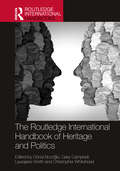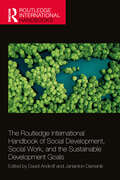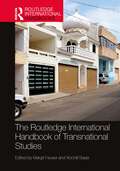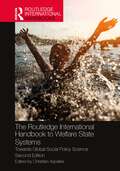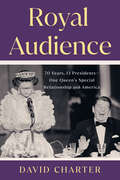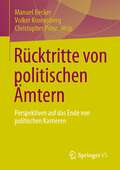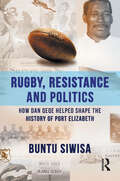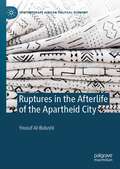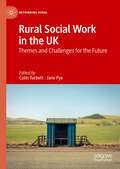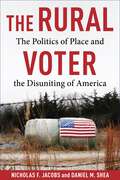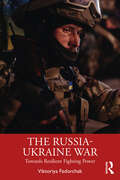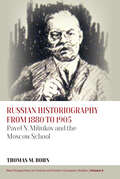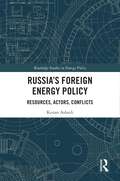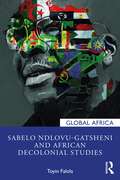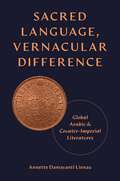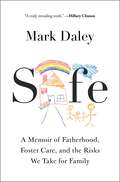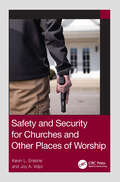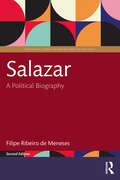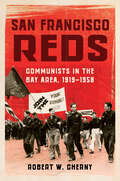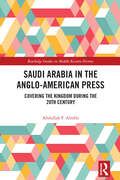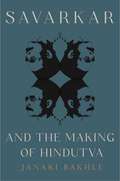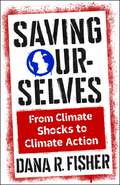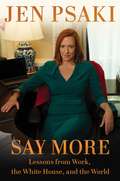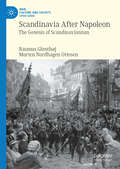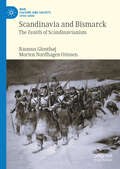- Table View
- List View
The Routledge International Handbook of Heritage and Politics (Routledge Handbooks on Museums, Galleries and Heritage)
by Gönül Bozoğlu Gary Campbell Laurajane Smith Christopher WhiteheadThe Routledge International Handbook of Heritage and Politics surveys the intersection of heritage and politics today and helps elucidate the political implications of heritage practices. It explicitly addresses the political and analyses tensions and struggles over the distribution of power. Including contributions from early-career scholars and more established researchers, the Handbook provides global and interdisciplinary perspectives on the political nature, significance and consequence of heritage and the various practices of management and interpretation. Taking a broad view of heritage, which includes not just tangible and intangible phenomena, but the ways in which people and societies live with, embody, experience, value and use the past, the volume provides a critical survey of political tensions over heritage in diverse social and cultural contexts. Chapters within the book consider topics such as: neoliberal dynamics; terror and mobilisations of fear and hatred; old and new nationalisms; public policy; recognition; denials; migration and refugeeism; crises; colonial and decolonial practice; communities; self- and personhood; as well as international relations, geopolitics, soft power and cooperation to address global problems.The Routledge International Handbook of Heritage and Politics makes an intervention into the theoretical debate about the nature and role of heritage as a political resource. It is essential reading for academics and students working in heritage studies, museum studies, politics, memory studies, public history, geography, urban studies and tourism.
The Routledge International Handbook of Social Development, Social Work, and the Sustainable Development Goals (Routledge International Handbooks)
by David Androff Janianton DamanikThe Routledge International Handbook of Social Development, Social Work, and the Sustainable Development Goals answers the question: What is the contribution of social development and social work to the Sustainable Development Goals? The success of these goals requires implementation, and each of the 17 objectives for sustainable social progress have a social dimension. The Sustainable Development Goals (SDGs), like the Millennium Development Goals (MDGs) before them, were born of a larger social development movement which over the last 25 years has become increasingly mainstream in the fields of international development, sustainability, and social work. These practitioners are essential to the implementation of the SDGs. This handbook examines how the SDGs are being implemented in diverse contexts. No previous work has surveyed social development and social work’s contribution to the SDGs nor represented voices from the Global South on the SDGs. This book broadens the current literature by focusing on key sites throughout the Global South and featuring underrepresented voices from Africa, Asia, and Latin America. These regions are vitally important to assessing the SDGs, as this is where innovative social development projects are occurring, and where social workers are playing a leading role in achieving the SDGs. The book is divided into eight parts: • Context of Social Development, Social Work, and the SDGs • Perspectives on the SDGs • Case Studies on Engagement with the SDG Agenda • Case Studies on Ending Poverty • Case Studies on Health and Well-Being • Case Studies on Gender Equality • Case Studies on Climate and Sustainability • Case Studies on Governance, Peace, and Justice It comprises 35 newly written chapters by 74 authors. It will be of interest to a broad interdisciplinary audience of scholars, educators, and students in the fields of social development, social welfare, social work, social policy, human rights, international relations, political science, international affairs, sustainability, community development, area studies, and development studies.
The Routledge International Handbook of Transnational Studies (Routledge International Handbooks)
by Xóchitl BadaThe Routledge International Handbook of Transnational Studies offers a comprehensive overview of the dynamic evolution and the most recent debates in this interdisciplinary field. The collection assembles scholarship from the social sciences and the humanities that share a critical perspective extending beyond the nation-state. The contributions investigate sustained connections, events, and activities across state borders and acknowledge prevailing global power asymmetries. The handbook examines the dynamics of transnational processes across seven main themes: epistemological and methodological principles; transnational migrant practices and family remittances; mobilities and (self-)identities; social protection; organizations and social movements; culture, religion, and the arts; and architecture and urban planning. The contributors engage with theoretical developments and analyze empirical cases involving a wide array of critical contemporary topics such as expatriate voting, first- and second-generation return migration, state-sponsored cross-border marriages, access to health care, transnational social work, global religious aesthetics, transnational art corridors, literary translation, remittance-financed architecture, and transnational processes of real estate development and gentrification, among others. They display a series of cross-cutting approaches including postcolonial theory, racism, and gender, and a focus on agency, state policies and macro-structures, and transnational inequalities. This book features multidisciplinary scholars in transnational studies from Australia, Belgium, Canada, Finland, Germany, Italy, Malaysia, Mexico, the Philippines, Poland, Spain, Sweden, the United Kingdom, and the United States. This handbook will be of interest to scholars interested in global and transnational perspectives across a wide range of disciplines. It will serve as a key resource for academics, students, and other interested audiences seeking to familiarize themselves with the study of contemporary issues that cross state borders.
The Routledge International Handbook to Welfare State Systems: Towards Global Social Policy Science (Routledge International Handbooks)
by Christian AspalterDeveloping countries may not have full-fledged welfare states like those we find in Europe, but certainly they have welfare state systems. For comparative social policy research, the term "welfare state systems" has many advantages, as there are numerous different types/models of welfare state systems around the world. This revised and expanded second edition brings together leading experts to discuss social policy in 32 countries/regions around the world: from the most advanced welfare state systems in Scandinavia and Western Central Europe to the developing powers of Brazil, China, India, Indonesia, Mexico, and Russia. Country-specific chapters provide in general a historical overview, discuss major characteristics of the welfare state system, and analyze country-specific problems, as well as critical current and future trends for further discussions, while also providing one (additional) major focal point/issue for greater in-depth analysis. Including new country case studies on Mali, South Africa, Iceland, Spain, Italy, Greece, and Vietnam, this book is reframed around urgent contemporary issues including migration and rising social inequalities, LGBTQIA+ rights, universal basic income, and transboundary social policy. It will be of great interest to all scholars and students of social policy, social development, development economists and health economists, experts in public policy, health policy (including mental health policy), housing policy, education policy, family policy, cis- and trans-gender policy, migration and population policy, sociology, social work, anthropology, as well as social policy and public policy makers and administrators.
Royal Audience: 70 Years, 13 Presidents--One Queen's Special Relationship with America
by David Charter70 years on the throne. 13 American presidents. One extraordinary queen.From the moment she first enchanted the world as a youthful princess, Queen Elizabeth II found a unique place in American hearts—and she also played an unprecedented role in forging transatlantic ties. Over her seventy-year reign, she developed extraordinary and varied personal bonds with thirteen U.S. presidents—Truman, Eisenhower, Kennedy, Nixon, Ford, Carter, Reagan, both Bush Sr. and Jr., Clinton, Obama, Trump, and Biden—that other diplomats and leaders could only dream of.A fascinating, in-depth look at international relations and interpersonal intrigue, Royal Audience peels back the curtain on the &“special relationship&” between the U.S. and the U.K. as embodied by the Queen herself—charting Elizabeth II&’s distinctive brand of one-to-one diplomacy through the eyes of those who experienced it firsthand. From horse-riding with Ronald Reagan, to sharing her recipe for scones with Dwight D. Eisenhower, to striking up a kinship with the Bushes and the Obamas, the Queen&’s interactions with her U.S. counterparts often acted as a restorative tonic for relations between two nations, even when political tensions ran high. Not all royal encounters with U.S. presidents went smoothly, though. Between Jackie Kennedy&’s complaints about Elizabeth and the Queen Mother&’s shock at being kissed on the lips by Jimmy Carter, there was never a dull moment.Throughout the years, Queen Elizabeth II&’s sense of duty and service remained steadfast, and her iconic legacy is unlikely to be repeated.
Rücktritte von politischen Ämtern: Perspektiven auf das Ende von politischen Karrieren
by Manuel Becker Volker Kronenberg Christopher PrinzPolitikwissenschaftliche und zeitgeschichtliche Untersuchungen zu den Karrieren deutscher Spitzenpolitiker*innen beschäftigten sich bislang vor allem mit deren Aufstieg und weniger mit dem Ende von politischen Laufbahnen. Aus welchen Gründen treten Politiker*innen aus dem Amt zurück? Was sind die Hintergründe, Motive und Konsequenzen einer solchen Entscheidung? Müssen Rücktritte zwingend Resultat eines Scheiterns sein oder kann es auch „erfolgreiche“ Rücktritte geben? In diesem Band werden theoretische Grundlagen der Rücktrittsforschung aus rechtlicher und politikwissenschaftlicher Perspektive erarbeitet, Rücktrittskulturen in unterschiedlichen Ländern vergleichend untersucht sowie verschiedene Fallbeispiele in ihren spezifischen Einzelfallbedingungen unter die Lupe genommen.
Rugby, Resistance and Politics: How Dan Qeqe Helped Shape the History of Port Elizabeth
by Buntu SiwisaBuntu Swisa has written a vivid biography of Dan Qeqe, the legendary sportsman, powerbroker and pioneer of black rugby and the liberation of sport. His book examines the complex and questionable relationships that Qeqe had with the enemies of non-racial sport, which cemented his power base. Siwisa tells the story of Qeqe’s life and times and at the same time has written a social and political biography of Port Elizabeth—a people’s history of Port Elizabeth. As much as Qeqe was a local legend, his achievements had national repercussions and, indeed, continue to this day. Print editions not for sale in Sub Saharan Africa.
Ruptures in the Afterlife of the Apartheid City (Contemporary African Political Economy)
by Yousuf Al-BulushiHow are poor people in South Africa confronting the persistent legacy of apartheid spatial segregation and anti-blackness? And what can movements across the world engaged in a global struggle against racial capitalism learn from the South African experience? This book explores the relationship between shack dwellers and the municipal government in South Africa. Grounded in the local realities of the struggle for housing and basic survival, the project makes broader interventions in national, continental and global debates about urban geography, African studies, social movements and race. The author argues that the shack settlement is emblematic of a democratic South Africa still profoundly shaped by apartheid's afterlife.
Rural Social Work in the UK: Themes and Challenges for the Future (Rethinking Rural)
by Colin Turbett Jane PyeThis book draws together writers from various backgrounds to discuss issues that affect those working in rural social work settings, on themes ranging from current issues that are common to rural localities (including those arising from the Covid-19 pandemic) to future challenges. Common themes that run through all the chapters and hold them together include community and place, stigma and alienation, inequality and social justice, and the environment. Several of the chapters include a strong user voice and challenge cis-heteronormative and other stereotypes of rural life by celebrating diversity in these communities. The book will therefore be invaluable to rural practitioners, students studying to work in rural settings and their educators, as well as rural sociologists and policy makers.
The Rural Voter: The Politics of Place and the Disuniting of America
by Nicholas F. Jacobs Daniel SheaThe widening gulf between rural and urban America is becoming the most serious political divide of our day. Support for Democrats, up and down the ballot, has plummeted throughout the countryside, and the entire governing system is threatened by one-party dominance. After Donald Trump’s surprising victories throughout rural America, pundits and journalists went searching for answers, popping into roadside diners and opining from afar. Rural Americans are supposedly bigots, culturally backward, lazy, scared of the future, and radical. But is it that simple? Is the country splintering between two very different Americas—one rural, one urban?This pathbreaking book pinpoints forces behind the rise of the “rural voter”—a new political identity that combines a deeply felt sense of place with an increasingly nationalized set of concerns. Combining a historical perspective with the largest-ever national survey of rural voters, Nicholas F. Jacobs and Daniel M. Shea uncover how this overwhelmingly crucial voting bloc emerged and how it has roiled American politics. They show how perceptions of economic and social change, racial anxieties, and a traditional way of life under assault have converged into a belief in rural uniqueness and separateness. Rural America believes it rises and falls together, and that the Democratic Party stands in the way.An unparalleled exploration of rural partisanship, this book offers a timely warning that the chasm separating urban and rural Americans cannot be papered over with policies or rhetoric. Instead, The Rural Voter shows how this division is the latest chapter in the enduring conflict over American identity.
The Russia-Ukraine War: Towards Resilient Fighting Power (Routledge Advances in Defence Studies)
by Viktoriya FedorchakThis book provides a systematic analysis of the Russian-Ukraine war, using the concept of resilient fighting power to assess the operational performance of both sides during the first year of the full-scale invasion.The Russian war in Ukraine began in 2014 and continued for eight years, before the full-scale invasion of 24 February 2022. It is not a new war, but the intensity of the warfighting revived many discussions about the conduct of inter-state warfare, which has not been seen in Europe for decades. This book does not aim to offer an exhaustive operational analysis of the war, but rather provides a preliminary systematic analysis across various domains of warfare using the concept of fighting power to assess the operational performance of both sides. First, the book discusses the conceptual component and the post-Cold War adaptations of the Soviet strategic tradition by both the Ukrainian and the Russian Armed Forces. Following that, it gives an evaluation of the various aspects of warfighting in the land, air, maritime and cyber domains. Then, the book examines the role of international allied assistance, sanctions and weapons delivery in strengthening the resilience of the Ukrainian Armed Forces. The book concludes with some comments on the role of inter-state warfare in the current strategic environment and future warfare.This book will be of much interest to students of military and strategic studies, defence studies, foreign policy, Russian studies and international relations.
Russian Historiography from 1880 to 1905: Pavel N. Miliukov and the Moscow School (New Perspectives on Central and Eastern European Studies #6)
by Thomas M. BohnIn Russian historiography, the Moscow School’s paradigm shift from political and legal history to social and economic history was markedly driven by Pavel Miliukov (1859-1943), the late leader of the Constitutional Democrats and foreign minister of the Provisional Government. Russian Historiography from 1880 to 1905 develops a narrative of historical sociology’s advancement through the Moscow School under Miliukov’s influence and provides a window into his decision making as a political figure who based his leadership not on public opinion but on the effectiveness of historical processes.
Russia’s Foreign Energy Policy: Resources, Actors, Conflicts (Routledge Studies in Energy Policy)
by Kenan AslanliThis book examines Russia’s multidimensional foreign energy policy and the emerging and ongoing conflicts with energy-consuming and transit countries. Russia’s Foreign Energy Policy examines whether the interdependence patterns shaped through various channels (such as foreign trade, investment, finance, technology, and social interactions) between Russia and energy-importing countries could prevent energy-based conflict. Drawing on semi-structured expert interviews, Kenan Aslanli challenges the one-sided conventional wisdom that focusses on foreign policy ambitions and overlooks the peculiarities of the energy dimension. Instead, Aslanli highlights the complexity of contemporary energy affairs using a holistic approach that goes beyond geopolitics. He examines various energy types such as crude oil, natural gas, and nuclear and considers a diverse range of actors which include energy companies and international organizations. Using examples from Europe, Asia, and the Middle East, Aslanli demonstrates how the Russian strategy of using energy resources as a tool or energy weapon for foreign policy goals has a diminishing return in the long run. This book will be of great interest to students and scholars of energy policy, foreign policy, and Russian studies more broadly.
Sabelo Ndlovu-Gatsheni and African Decolonial Studies (Global Africa)
by Toyin FalolaThis book considers the work of the preeminent scholar on decoloniality, Sabelo Ndlovu-Gatsheni, as a means of examining the development of decoloniality discourse and considering the future direction of the African knowledge economy. Sabelo Ndlovu-Gatsheni has been instrumental in the construction of theories and ideas necessary for advancing a decolonial system of education and epistemology. This book considers how Professor Ndlovu-Gatsheni’s work has helped to shape our thinking both on Mugabe and the history of Zimbabwe, and beyond to the broader questions of race, liberation, higher education, and the future of decolonial studies. Renowned author Professor Toyin Falola then invites us to consider the dangers of continued repression of African epistemologies, and the enormous benefits of an alternative knowledge economy in which a diverse multiplicity of ideas drives our understanding of the world on to new heights. Unpacking the various conceptual leanings of decoloniality through the works of one of its leading lights, this book will be an essential read for researchers across the fields of African Studies, Race Studies, Philosophy, and Education.
Sacred Language, Vernacular Difference: Global Arabic and Counter-Imperial Literatures (Translation/Transnation #52)
by Annette Damayanti LienauHow Arabic influenced the evolution of vernacular literatures and anticolonial thought in Egypt, Indonesia, and SenegalSacred Language, Vernacular Difference offers a new understanding of Arabic&’s global position as the basis for comparing cultural and literary histories in countries separated by vast distances. By tracing controversies over the use of Arabic in three countries with distinct colonial legacies, Egypt, Indonesia, and Senegal, the book presents a new approach to the study of postcolonial literatures, anticolonial nationalisms, and the global circulation of pluralist ideas.Annette Damayanti Lienau presents the largely untold story of how Arabic, often understood in Africa and Asia as a language of Islamic ritual and precolonial commerce, assumed a transregional role as an anticolonial literary medium in the nineteenth and twentieth centuries. By examining how major writers and intellectuals across several generations grappled with the cultural asymmetries imposed by imperial Europe, Lienau shows that Arabic—as a cosmopolitan, interethnic, and interreligious language—complicated debates over questions of indigeneity, religious pluralism, counter-imperial nationalisms, and emerging nation-states.Unearthing parallels from West Africa to Southeast Asia, Sacred Language, Vernacular Difference argues that debates comparing the status of Arabic to other languages challenged not only Eurocentric but Arabocentric forms of ethnolinguistic and racial prejudice in both local and global terms.
Safe: A Memoir of Fatherhood, Foster Care, and the Risks We Take for Family
by Mark DaleyA heartrending and unforgettable memoir of an unlikely journey to parenthood through America&’s broken foster care system.What does it take to keep a child safe? As a long-time strategist and activist fighting for better outcomes for foster children, Mark Daley thought he had the answer. But when Ethan and Logan, an adorable infant and a precocious toddler, entered into their lives, Mark and his husband Jason quickly realized they were not remotely prepared for the uncertainty and complication of foster parenting. Every day seven hundred children enter the foster care system in the United States, and thousands more live on the brink. Safe offers a deeply personal window into what happens when the universal longing for family crashes up against the unique madness and bureaucracy of a child protection system that often fails to consider the needs of the most vulnerable parties of all—the children themselves. Daley takes us on a roller coaster ride as he and Jason grapple with Ethan and Logan&’s potential reunification with their biological family, learn brutal lessons about sacrifice, acceptance, and healing, and face the honest, heartbreaking, and sometimes hilarious challenges of becoming a parent at the intersection of intergenerational trauma, inadequate social support, and systemic issues of prejudice. For fans of Nicole Chung&’s All You Can Ever Know, Stephanie Land&’s Maid, and Roxanna Asgarian&’s We Were Once a Family, this touching and suspenseful memoir highlights the impossible choices all parents, in the foster system and beyond, face in raising children today. Safe shines a much-needed spotlight on how this country treats the most vulnerable among us, sounding a vital call to overhaul a thoroughly broken system.
Safety and Security for Churches and Other Places of Worship
by Kevin L. Erskine Joy A. VolpiSafety and Security for Churches and Other Places of Worship is a reference book focused on how to form a first responder team for churches, synagogues, temples, and other places of worship. It will assist team leaders on how to train for both security and medical emergencies, provide training aids and ideas, and how to write SOPs and legal issues. Trending violence directed at soft targets is growing, forcing places of worship to respond with highly trained personnel to quickly intervene. Many medical incidents can have drastically better outcomes if trained medical personnel render immediate medical care. For instance, the use of an AED in conjunction with CPR can drastically improve survival rates from 15% to 85%, versus just CPR alone. Topics covered include: Environmental disasters Acts of violence Active shooter incidents Bomb threats Unruly/disruptive persons Suspect control Sexual abuse Realistic training using fake wounds Tabletop exercises Team building Medical emergencies An equipment chapter helps to determine what equipment is a priority for teams limited by budget. Some equipment can mean the difference between a "friend" being mistaken for an aggressor, resulting in an innocent person being injured or killed. Safety and Security for Churches and Other Places of Worship is a must-have reference for anyone charged with the duty to protect those who attend and work at places of worship.
Salazar: A Political Biography (Routledge Studies in Fascism and the Far Right)
by Filipe Ribeiro de MenesesSalazar: A Political Biography is the definitive biography of the longstanding Portuguese dictator. António de Oliveira Salazar entered the government of Portugal when Herbert Hoover was president and ended his political career at the end of the Johnson administration. He remained in power for forty years (1928–1968), one of the longest tenures in modern history. Unlike the other ‘great dictators’ of the twentieth century, Salazar, an academic, immersed himself in the minutiae of government and administration, maintaining a prodigious work rate until illness forced his retirement. He successfully managed his country’s finances despite the impact of the Great Depression, imposing a harsh policy of austerity. He then preserved Portugal’s neutrality during the Second World War, ultimately favouring Great Britain and the United States. But Salazar was at heart an extremely conservative, even reactionary statesman. He relied on secrecy and a police state to maintain the order which, he believed, was necessary to control progress. Rejecting the anti-colonialist movements in Asia and Africa, he plunged Portugal into a series of wars in Africa it could ill afford. Fully revised and updated throughout, this remains the authoritative biography of a key Portuguese political leader who was a significant presence in twentieth-century politics. This book will be of interest to historians of the far right, international diplomacy and Portugal.
San Francisco Reds: Communists in the Bay Area, 1919-1958
by Robert W. ChernyFounded in 1919, the Communist Party (CP) in San Francisco survived an ineffectual early period to become a force in the trade union heyday of the 1930s. Robert Cherny uses the lives and careers of more than fifty members to tell the story of the city’s CP from its founding through 1958. Cherny draws on FBI files, the records of the CP at the Russian State Archive for Social and Political History, interviews, and memoirs to follow male and female party and union leaders, rank-and-file members, and others. His history reveals why people joined the CP while charting the frequent changes in policy, constant member turnover, and disruptive factionalism that limited party aims and successes. Cherny also follows his subjects through their resignations, expulsions, or other reasons for departure and looks at the CP’s influence on their lives in subsequent years. Vivid and exhaustively researched, San Francisco Reds is a long view account of the personal motivations and activism of an Old Left generation in a West Coast city.
Saudi Arabia in the Anglo-American Press: Covering the Kingdom during the 20th Century (Routledge Studies in Middle Eastern History)
by Abdullah F. AlrebhThis book provides an in-depth analysis of authority structures in Saudi Arabia during the twentieth century, as presented in two leading Western newspapers, The London Times and The New York Times. Beginning with a history of Saudi Arabia – from the building of the Kingdom in 1901, when Ibn Saud left his exile in Kuwait to recover Riyadh back from Al-Rasheed’s rule, until the death of King Fahd in 2005 – the author then outlines the theoretical framework of the book, specifically Weber’s original conception of authority. Weber’s notion of authority as having three types – traditional, charismatic, and rational-legal – is applied to an analysis of the two newspapers over the course of the twentieth century. A timeline is devised to aid this analysis, based on significant turning points in Saudi history, including Ibn Saud’s declaration of the Kingdom in 1932 and King Faisal’s assassination in 1975. Ultimately, this analysis discloses the many ways in which conceptions of authority in the Middle East were presented to Western audiences, whilst illuminating the political agendas inherent to this coverage in the UK and the US. This book is vital reading for anyone interested in Saudi Arabian history, Western perspectives of the Middle East, and the sociology of media.
Savarkar and the Making of Hindutva
by Janaki BakhleA monumental intellectual history of the pivotal figure of Hindu nationalismVinayak Damodar Savarkar (1883–1966) was an intellectual, ideologue, and anticolonial nationalist leader in India&’s struggle for independence from British colonial rule, one whose anti-Muslim writings exploited India&’s tensions in pursuit of Hindu majority rule. Savarkar and the Making of Hindutva is the first comprehensive intellectual history of one of the most contentious political thinkers of the twentieth century.Janaki Bakhle examines the full range of Savarkar&’s voluminous writings in his native language of Marathi, from political and historical works to poetry, essays, and speeches. She reveals the complexities in the various positions he took as a champion of the beleaguered Hindu community, an anticaste progressive, an erudite if polemical historian, a pioneering advocate for women&’s dignity, and a patriotic poet. This critical examination of Savarkar&’s thought shows that Hindutva is as much about the aesthetic experiences that have been attached to the idea of India itself as it is a militant political program that has targeted the Muslim community in pursuit of power in postcolonial India.By bringing to light the many legends surrounding Savarkar, Bakhle shows how this figure from a provincial locality in colonial India rose to world-historical importance. Savarkar and the Making of Hindutva also uncovers the vast hagiographic literature that has kept alive the myth of Savarkar as a uniquely brave, brilliant, and learned revolutionary leader of the Hindu nation.
Saving Ourselves: From Climate Shocks to Climate Action (Society and the Environment)
by Dana R. FisherWe've known for decades that climate change is an existential crisis. For just as long, we've seen the complete failure of our institutions to rise to the challenge. Governments have struggled to meet even modest goals. Fossil fuel interests maintain a stranglehold on political and economic power. Even though we have seen growing concern from everyday people, civil society has succeeded only in pressuring decision makers to adopt watered-down policies. All the while, the climate crisis worsens. Is there any hope of achieving the systemic change we need?Dana R. Fisher argues that there is a realistic path forward for climate action—but only through mass mobilization that responds to the growing severity and frequency of disastrous events. She assesses the current state of affairs and shows why public policy and private-sector efforts have been ineffective. Spurred by this lack of progress, climate activism has become increasingly confrontational. Fisher examines the radical flank of the climate movement: its emergence and growth, its use of direct action, and how it might evolve as the climate crisis worsens. She considers when and how activism is most successful, identifying the importance of creating community, capitalizing on shocking moments, and cultivating resilience. Clear-eyed yet optimistic, Saving Ourselves offers timely insights on how social movements can take power back from deeply entrenched interests and open windows of opportunity for transformative climate action.
Say More: Lessons from Work, the White House, and the World
by Jen PsakiINSTANT NEW YORK TIMES BESTSELLER Former White House Press Secretary and current MSNBC host Jen Psaki shares the surprising lessons she&’s learned on her path to success and offers unique yet universal advice about how to be a more effective communicator in any situation.Not many White House Press Secretaries capture the nation&’s interest the way Jen Psaki did. Refreshingly candid and clear, Psaki quickly became known for her ability to break through the noise and successfully deliver her message. In her highly anticipated book, Psaki shares her journey to the Briefing Room and beyond, taking readers along the campaign trail, to the State Department, and inside the White House under two Presidents. With her signature wit, Psaki writes about reporting to bosses from the hot-tempered Rahm Emanuel to the coolly intellectual Barack Obama to the surprisingly tenderhearted John Kerry. She also talks about her time working closely with President Joe Biden from the start of his administration to set a new tone for the country, restoring a sense of calm and respect for the role of the media in our Democracy. Since leaving the White House, Psaki&’s star has continued to rise. She launched a highly rated show on MSNBC and was so successful that in just six months she was given an additional primetime Monday slot, ahead of Rachel Maddow. And Psaki&’s work doesn&’t end at the office. She is the mother of two young children and shares her stories about the journey of communicating as a parent: During one bedtime briefing, her young daughter asked the question, &“Why do wars start?&”, which Jen carefully explained and then got a follow up: &“Have you ever seen a unicorn?&” In Say More, Psaki explains her straightforward approach to communication, walking readers through difficult conversations as well as moments where humor saves the day—whether it is with preschoolers, partners, or presidents. She addresses the best ways to give and receive feedback, how to connect with your audience, how to listen actively, and much more. Say More is the book Psaki wishes she had when she started her career, and is a trove of entertaining, essential lessons from one of the most prominent voices in American politics today.
Scandinavia After Napoleon: The Genesis of Scandinavianism (War, Culture and Society, 1750–1850)
by Rasmus Glenthøj Morten Nordhagen OttosenThis book explores the intellectual grounds of Scandinavianist ideology and its political development into a national unification movement. Denmark, Norway and Sweden were nearly annihilated during the Napoleonic Wars. The lesson learned was that survival was a matter of size. Whereas their union of 1814 offered Sweden-Norway geostrategic security tempered by fear of Russia, Denmark was the biggest territorial loser of the Napoleonic Wars and faced separatism connected to German nationalism in the duchies of Schleswig and Holstein. This evolved into a national conflict that threatened Denmark’s survival as a nation. Meanwhile, a new generation of Danes, Swedes and Norwegians had come to regard kindred language, culture and religion as a case for Scandinavian union that could offer protection against Russia and Germany. When the European revolutions of 1848 unleashed the First Schleswig War, the influence of Scandinavianism was such that it nearly turned into a Scandinavian war of unification.
Scandinavia and Bismarck: The Zenith of Scandinavianism (War, Culture and Society, 1750–1850)
by Rasmus Glenthøj Morten Nordhagen OttosenThis book accounts for Scandinavian unification efforts in a time of great upheaval. The ideological repercussions of the European revolutions of 1848-1849 and the Crimean War (1853-1856) transformed both the international political system and nationalism into more ‘realist’ types. The First Schleswig War (1848-1851) having nearly turned into one of Scandinavian unification, the influence of Scandinavianism extended into the Danish, Swedish and Norwegian courts, cabinets and parliaments, attracting interest from the great powers. The Crimean War offered another window of opportunity for Scandinavian unification, before the Danish-German conflict over the duchies of Schleswig and Holstein nearly united Scandinavia upon the outbreak of the Second Schleswig War in 1864. The ultimate failure of Scandinavianism in its unification efforts was not predetermined, although historiography has made it appear as such. Napoleon III, Cavour and Bismarck all actively contributed to plans for Scandinavian unification, the latter even declaring himself as “very strongly Scandinavian”.
